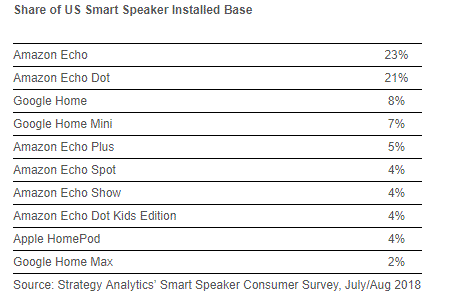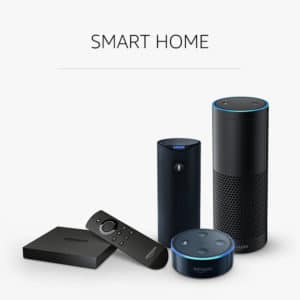Wondering what device your in-home radio listening will most likely be heard on?
A new consumer survey shows that nearly one in four smart speakers will answer to requests directed to an AI-powered female by the name of Alexa.
According to newly released data from Strategy Analytics, the most popular smart speaker model in the U.S. is the Amazon Echo.
It accounts for 23% of all smart speakers in use.
Don’t stop there: Including all its models, Amazon accounts for 63% of smart speakers in use.
By comparison, Google accounts for 17% of smart speakers in use, with Apple registering a 4% home penetration for its smart speaker device.
That’s just some of the important-to-radio findings seen in “Smart Speaker User Survey – U.S. Results,” from Strategy Analytics.
While Alexa may be the Queen of the smart speaker space today, her throne isn’t cemented.
The study suggests there is plenty of opportunity for other smart speaker brands. When asked to name one brand they would choose for their next smart speaker, 54% of users chose either Amazon, Google or Apple, leaving nearly half the market open to competitors.
The most preferred alternatives to these “big three” brands are Bose, Samsung and Sonos.
The data is based on an online survey of 1,011 smart speaker users in the U.S. in July and August 2018.
The survey also found that 88% of smart speaker homes own at least one Amazon smart speaker, and 31% own at least one Google smart speaker, indicating that many homes are happy to use different voice assistant platforms.
Strategy Analytics’ research also shows that multiple ownership of smart speakers is already commonplace: 58% of users say they have two or more smart speakers at home. 62% use a smart speaker in the family room, 41% in a bedroom and 39% in the kitchen. 12% have installed a smart speaker in the bathroom.

“Amazon and Google may dominate today’s market, but this will not always be the case,” said David Watkins, Director of Smart Speakers at Strategy Analytics. “Many consumers are ready to consider alternative brands, assuming they meet the high expectations identified in this study, including high quality audio, superior design and device compatibility.”





